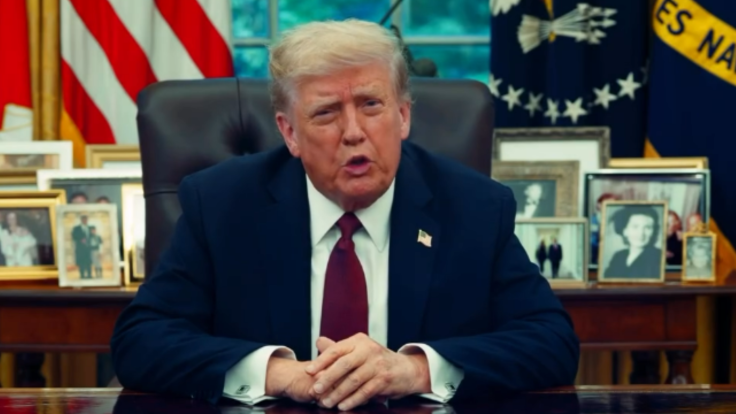Trump's $100K Visa Fee Sparks Tech Backlash, Airport Panic, and Fears of US Brain Drain

KEY POINTS
- The White House clarified the fee applies only once and not annually, after chaotic roll-out caused airport panic.
- Executives like Andrew Ng and Esther Crawford argue the move threatens America's competitive edge.
US President Donald Trump's new $100,000 ( £74,000) visa fee for foreign workers has drawn sharp criticism from the global tech community, triggering confusion at airports, concerns of brain drain, and growing fears that the policy could derail American innovation.
In a wave of social media condemnation over the weekend, tech executives, startup founders, and economists expressed dismay over the hefty cost attached to H-1B visa applications—used predominantly by major tech employers such as Amazon, Meta, and Microsoft to hire highly skilled workers from abroad.
While the White House scrambled to clarify the policy late Friday, the initial announcement sent shockwaves through U.S. airports and immigration forums, with some travelers choosing to disembark planes or cancel plans to avoid uncertainty at the border.
Tech Leaders Decry 'Anti-Innovation' Policy
'America's edge has always been that we attract smart, ambitious people from everywhere,' said Esther Crawford, a former Twitter executive now at Meta. 'High-skilled immigrants don't take from us, they build with us. Some of the best colleagues in my career have been H-1B holders chasing their own American dream.'
The new policy, introduced with little advance notice, imposes a one-time $100,000 (£74,000) fee for H-1B applications by U.S. companies, according to the Trump administration. Although the White House later clarified the fee would not be charged annually and would not apply to existing visa holders, many critics argue the damage has already been done.
'My heart goes out to all the families and individuals anxious over their futures following the abrupt and chaotic announcement of H-1B visa changes,' wrote Andrew Ng, founder of DeepLearningAI, in a LinkedIn post. 'America should be working to attract more skilled talent, not create uncertainty that turns them away.'
Economic Alarm Bells
According to economists at Berenberg, the policy may deepen structural weaknesses in the U.S. labour market, which has yet to fully recover from Trump-era trade disruptions.
'By making it very expensive for companies to attract foreign talent, and by forcing some international students to leave the country after graduation, the brain drain will weigh heavily on productivity,' the analysts warned in a research note.
They also cautioned that while artificial intelligence may offer efficiency gains, it cannot fully offset the rising costs and talent shortages many firms face.
David Seidman, head of platform security at fintech firm Plaid, predicted the decision would push big tech companies to relocate jobs abroad. 'At least one of the Big Tech names will stop hiring for those jobs in the United States and build out their footprint in India or Canada,' he said.
Confusion and Chaos at Airports
The sudden announcement triggered panic among international travelers. Some chose to delay departures, while others raced home after being advised by employers that the rule might affect re-entry or employment status.
White House officials, caught off-guard by the backlash, were forced to clarify within hours that the visa fee would apply only once per worker and not affect current visa holders.
Still, the confusion stoked anxiety and frustration. For international graduates hoping to remain in the U.S. after completing degrees in fields like computer science or engineering, the rule poses a new financial and bureaucratic barrier.
Divided Reactions Among Business Leaders
While most in the tech sector were alarmed, a handful of business leaders offered support for the move. IBM Vice Chairman Gary Cohn, who served in Trump's first administration, said the fee was 'a good idea' that would help screen applicants for high-value positions.
Netflix Chairman Reed Hastings echoed that sentiment, writing on X that the higher cost would ensure visas are reserved for 'very high value jobs' and create more predictability for workers who secure them.
Yet critics say that framing misses the broader implications for startups, universities, and emerging tech ecosystems that rely on global mobility.
Political Fallout Ahead?
The visa decision comes as Trump walks a tightrope between his nationalist rhetoric and the demands of Silicon Valley—a sector that donated generously to his re-election campaign. With the 2026 election cycle nearing, the policy risks alienating a powerful donor base while also igniting global concern about America's role as a tech and innovation leader.
For now, the backlash shows no signs of fading. As Esther Crawford put it: 'This isn't just about money. It's about who we are as a country.'
© Copyright IBTimes 2025. All rights reserved.





















